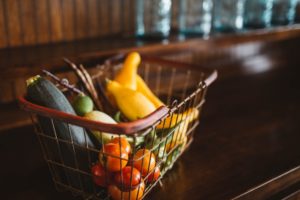Clean Eating
 June fifth is coming up soon – World Environment Day. And boy, do we have a lot of issues to address! But one essential dimension of our impact on the environment that calls out right now is what we choose to eat.
June fifth is coming up soon – World Environment Day. And boy, do we have a lot of issues to address! But one essential dimension of our impact on the environment that calls out right now is what we choose to eat.
“Clean eating” is a phrase that’s becoming popular in some circles these days. It has a big impact not only on our health, but also on the environment of the Earth. It happens when people avoid refined, sweet, or processed food, as well as those with artificial ingredients such as preservatives and additives. The goal of clean eating is to eat whole, natural foods, including fruits, vegetables, whole grains, healthy fats, and lean proteins.
Trinity United Church of Christ in Chicago is a congregation that understands that there is an intimate connection between sustainable food and economic empowerment.1 Co-pastors Otis Moss and Monica Brown Moss see environmental awareness and racial justice intertwined. Pastor Monica says this approach looks to the Earth as an example of how to build relationships that are not oppressive. Pastor Otis says, “When we recognize the interdependence and interconnection in nature, we begin to build human systems that are interdependent and interconnected.”
While clean eating can mean different things to different people, experts tend to agree on its basics as including:2
- Choosing whole, minimally processed foods, such as grains, beans, and nuts;
- Deciding not to follow detox diets or cleanses, which can upset the balance of good bacteria in the gut;
- Avoiding excess sugars and refined carbohydrates; and
- Selecting produce that is well below levels that could cause health problems, whether it is organic or not.
For Christians, clean eating naturally weaves together ecology, health, and justice with discipleship. “Eating reminds us that we participate in a grace-saturated world, a blessed action,”3 says professor and author Norman Wirzba. “To eat is to be implicated in a vast, complex interweaving set of life-and-death dramas in which we are only one character among many.”
He explains further. “When we think of food as a commodity, we think what matters is, ‘Is the food cheap? Is the food convenient? Is the food in big supply?’ . . . It’s destroying and degrading our soil; it’s polluting our waters; it’s abusing the animals; and it’s abusing agricultural workers.”
Instead, we can realize that “life and food are precious gifts. . . . It’s not simply fuel to keep your machine-like body on the move. Eating is an act of profound intimacy, because when you eat, you consume the flesh of plants, the flesh of animals. . . . When you take a bite, you bite into the whole world.”4 Eating mindfully leads us to ask ourselves, “Are we worthy of receiving the life and the death of others?”
A note of hope is as people do responsible shopping, becoming educated on what items are in our stores. Another encouraging development is the growth of local food systems, which have great accountability built in, with fresher produce, and where farmers and consumers can be closer to one another.5
One example of local food systems is Plainsong Farm, cofounded by Rev. Nurya Love Parish. “I saw food as a natural connection between discipleship and the stewardship of Creation,” says Parish. “Too often I felt like a lonely Christian in (mostly secular) food systems advocacy. And I felt like a weird person in my church, where we provided food for the poor, but didn’t always consider the ecological implications of our charitable food choices.”
So Rev. Parish started a farm-based ministry called the Christian Food Movement. “At Plainsong Farm, we incorporated charitable food into our ministry from the beginning,” she says. “Now, we’re looking at adding educational programs and worship.” Beginning with a directory of similarly-oriented farms, she says, “Our goal is to be a one-stop location for people and projects at the intersection of Christian faith and a better food system. We want to provide opportunities for healthy cross-pollination between regions, denominations and sectors.”
Folks like the Norma Wirzba, the Trinity UCC co-pastors, and Nurya Love Parish all point to clean eating as a way to change both our way of eating and its effect on the ecological system. “It’s possible to change even a lifetime of unhealthy eating habits, patterns, obsessions, rituals, neurosis and fears,” says Parish. Learning to engage in clean eating can be a positive thing, indeed.
Betsy Schwarzentraub
1 – Celeste Kennel-Shank, “Chicago church connects sustainable food, economic empowerment,” The Christian Century, September 20, 2017.
2 – Kirsten Weir, “‘Clean Eating’ Simplified,” Arthritis Today, January-February 2017, p. 16.
3 – Norman Wirzba, Food and Faith: A Theology of Eating. Wirzba is Professor of Theology and Ecology at Duke Divinity School and Nicholas School of the Environment.
4 – YouTube, Food, Farming, and Faith, Office Hours at Duke University, November 23, 2015.
5 – You Tube, A Theology of Eating, Office Hours at Duke University, November 17, 2010.
See also: Food, Simple or Easy


